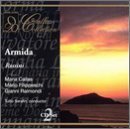| All Artists: Gioachino Rossini, Tullio Serafin, Florence May Festival Orchestra & Chorus, Alessandro Ziliani, Antonio Salvarezza, Francesco Albanese, Gianni Raimondi, Marco Stefanoni, Maria Callas, Mario Filippeschi, Mario Frosini Title: Rossini: Armida Members Wishing: 0 Total Copies: 0 Label: Opera D'oro Original Release Date: 1/1/1952 Re-Release Date: 6/20/2000 Genre: Classical Styles: Opera & Classical Vocal, Historical Periods, Modern, 20th, & 21st Century Number of Discs: 2 SwapaCD Credits: 2 UPC: 723723828224 |
Search - Gioachino Rossini, Tullio Serafin, Florence May Festival Orchestra & Chorus :: Rossini: Armida
 | Gioachino Rossini, Tullio Serafin, Florence May Festival Orchestra & Chorus Rossini: Armida Genre: Classical
|
Larger Image |
CD Details |
CD ReviewsA Classic Callas Performance 07/25/2000 (4 out of 5 stars) "This Armida stems from the early fifties, when Rossini revival was only at its beginning. Therefore most of the singers do not have the style or coloratura ability we'd expect from modern Rossini interpreters. Futhermore, the score is heavily cut, and a better part of the famous trio for three tenors is missing (I am not sure whether this is due to the original tape or the Opera d'Oro issue). Finally, the sound is rather awful; it seems to get worse towards the end. But, this being said, this is still an essential release for any of Callas fans. She is here caught at the height of her powers, and both dramatically and vocally she will probably never be matched in this role. She throws high Ds, E-flats and even a high F (if I pitched it correctly) and "D'amore il dolce impero" is far more elaborately decorated than her later concert performance of this aria. In any case, if you can tolerate horrible sound and inadequate supporting cast, you will hear the greatest Armida ever." VOCAL MIRACLE! Emma de Soleil | On a holiday In Ibiza, then back to the UK for stu | 01/30/2004 (5 out of 5 stars) "This is perhaps the greatest display of belcanto di bravura ever recorded. Callas goes up to an F in alto, and a ROCK-SOLID one! The allure of the enchantress Armida is brought to life like never before and never after. A TOP-NIGHT for Callas who did her greatest, most astonishing belcanto singing here, an opera not even Sutherland attempted to sing! To comprehend why Callas is the queen of belcanto, listen to her "D'Amore Al Dolce Impero"!!! People say Callas wasn't ideal for Belcanto? This recording proves that this is anything but true! ENJOY THE PERFORMANCE OF A LIFETIME!" Goddess of belcanto! Annabelle Legarski | 06/16/2004 (5 out of 5 stars) "Callas' Armida is the belcanto-miracle of the century. La Divina outshines them all, how amazing! Coloratura, acuti, arpeggios, roulades, scales are done to perfection. And the interpretation is BLAZING, the phrasing and diction crystal-clear and idiomatic. The only ARMIDA to buy!"
|

 Track Listings (18) - Disc #1
Track Listings (18) - Disc #1